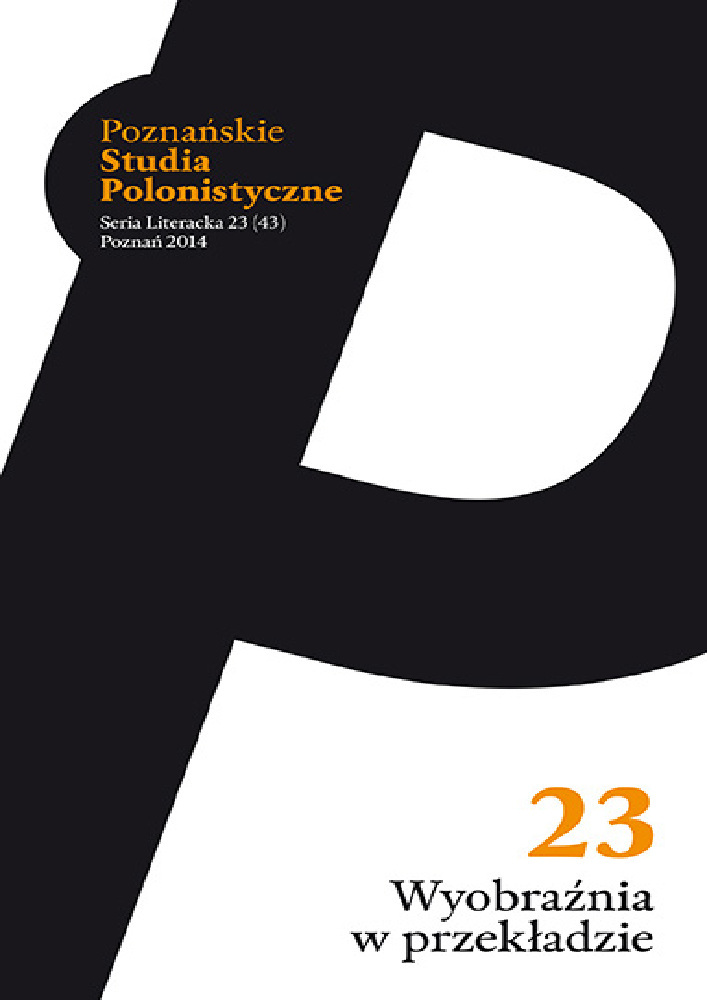Abstract
The term “imagination” has numerous meaning: colloquial, paraliterary, scientific. They all refer to auto-communication, which is a conversation of an individual with him or herself, when our mind faculties: memory, intuition, observation, intelligence, knowledge – and imagination, too – compete for dominance or strive for harmonious cooperation. Similarly to the generally understood imagination, its particular, important species (literary imagination) requires internal classification, because it is always an imagination of role: of the author, the reader, the expert, the performer, the censor, the distributor, or sometimes of the translator. The question of translator’s and author’s status provokes a comparison between author’s and translator’s imagination: they share some qualities, but also have decidedly different ones. The opposition between created nature and creating nature, which is a notion used by Józef Czechowicz, might be helpful in capturing the similarities and differences. But this opposition, too, demands a literary and historical context. The author created by the romantic myth seems someone gifted with imagination creating literary worlds, which are limitless, whereas the author of realist works, especially diaries, must give priority to observation, when a piece of external, empirical reality is described and recorded. Baroque, romanticism, realism, expressionism, avant-
garde, postmodernism differ in their canons of imagination. The creative process by the author of an original work becomes a negotiation between innovations of authorial fantasy and recreation of the canon. The translator is under much stronger pressure from his or her times, because his or her objectives and tasks are different. Usually, knowledge is enough for a translator: linguistic, historical, literary, common, encyclopaedic, specialised. If knowledge fails, the translator reaches out to imagination as an instrument for interpretation of source text, but this happens only when the text is ambiguous and rich in images. Be it as it may, the quality and range of translator’s activity are determined by someone else’s imagination, accumulated in the translated work, and present in its rhetorics.
References
Balcerzan E., Metafory, które „wiedzą”, czym jest tłumaczenie, w: idem, Tłumaczenie jako „wojna światów”. W kręgu translatologii i komparatystki, Poznań 2011, s. 212–229.
Balcerzan E., Wiersze niewszystkie, Mikołów 2009.
Balcerzan E., Rajewska E., Pisarze polscy o sztuce przekładu 1440–2005. Antologia, Poznań 2007.
Łotman J., Uniwersum umysłu. Semiotyczna teoria kultury, tłum., przedmowa B. Żyłko, Gdańsk 2008.
Orliński M., Zwoływanie wyobraźni, „Akcent” 2010, nr 3.
Perec G., Życie. Instrukcja obsługi. Powieści, tłum. W. Brzozowski, Warszawa 2001.
Szurek A., Fantazja i wyobraźnia: próby usystematyzowania pojęć w angielskich dyskursach o literaturze od renesansu do romantyzmu, http://www.tolkien.com.pl/hobbickanorka/artykuly/wyobr.html, dostęp: 29 kwietnia 2014.
License
Authors
Authors of texts accepted for publication in „Poznańskie Studia Polonistyczne. Seria Literacka” are required to complete, sign and return to the editor's office the Agreement for granting a royalty-free license to works with a commitment to grant a CC sub-license.
Under the agreement, the authors of texts published in „Poznańskie Studia Polonistyczne. Seria Literacka” grant the Adam Mickiewicz University in Poznań a non-exclusive, royalty-free license and authorize the use of Attribution-NoDerivatives 4.0 International (CC BY-ND 4.0)Creative Commons sub-license.
The authors retain the right to continue the free disposal of the work.
Users
Interested Internet users are entitled to use works published in „Poznańskie Studia Polonistyczne. Seria Literacka” since 2016, for non-commercial purposes only, under the following conditions:
- attribution - obligation to provide, together with the distributed work, information about the authorship, title, source (link to the original work, DOI) and the license itself.
- no derivatives - the work must be preserved in its original form, without the author's consent it is not possible to distribute the modified work, such as translations, publications, etc.
Copyrights are reserved for all texts published before 2016.
Miscellaneous
Adam Mickiewicz University in Poznań retains the right to magazines as a whole (layout, graphic form, title, cover design, logo etc.).
